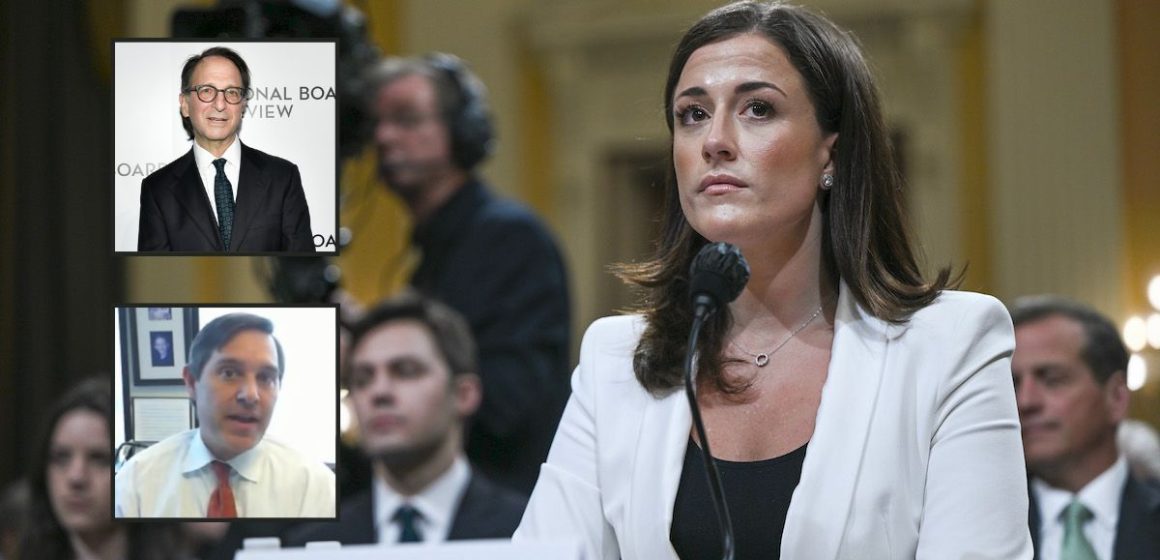Andrew Weissmann, perhaps most famously known as Robert Mueller’s right-hand man during the Russiagate investigation, responded Thursday on the merits of a defamation lawsuit filed by a former White House lawyer from the first Donald Trump administration.
In September 2023, attorney Stefan Passantino sued Weissmann, who is now a law professor at NYU and an MSNBC podcast host, over a post the former federal prosecutor made on X (formerly Twitter).
The lawsuit claims Weissmann damaged Passantino’s decades-old legal reputation in a tweet where Weissmann said a star witness for the Jan. 6 Committee had been coached to lie by one of her attorneys.
The case was first assigned to U.S. District Judge Tanya Chutkan — the judge overseeing the soon-to-be-shuttered Jan. 6 case against the president-elect — but transferred to U.S. District Judge U.S. District Judge Loren AliKhan in December 2023. Since then, Weissmann tried and failed to have the lawsuit dismissed. Now, in a 19-page answer, the defendant is disputing the basic claims in Passantino’s complaint.
The underlying dispute between the two attorneys can be sourced to congressional testimony given by Cassidy Hutchinson, an aide to Mark Meadows, the final chief of staff during the first Trump administration.
Hutchinson testified she had briefly been represented by Passantino after being subpoenaed to appear before the House Select Committee to Investigate the January 6th Attack on the U.S. Capitol.
“The less you remember, the better,” Hutchinson recalled Passantino telling her at the time — a headline-generating phrase that drew a sufficient amount of attention to lawyering dynamics.
“I want to make this clear to you,” Hutchinson told the committee during a deposition. “Stefan never told me to lie. He specifically told me, ‘I don’t want you to perjure yourself, but ‘I don’t recall’ isn’t perjury. They don’t know what you can and can’t recall.’”
“He didn’t tell me to lie,” she later said. “He told me not to lie. But ‘I don’t recall’ is not a lie” to Passantino, Hutchinson added.
Hutchinson later switched lawyers — retaining the services of Jody Hunt, a former U.S. Department of Justice attorney.
On Sept. 15, 2023, Weissmann tweeted about Hutchinson’s counsel:
Within a week, Passantino, in his lawsuit, alleged that Weissmann’s tweet amounted to an “insidious lie” and “smear.”
More Law&Crime coverage: Lawyers want Donald Trump ethics lawyers who represented former White House aide before Jan. 6 committee disbarred
Now, Weissmann is flatly denying just about everything in the complaint.
In essence, and a sort of pro forma fashion, the defendant’s answer all but categorically rejects the plaintiff’s claims.
Take, for example, this passage from Passantino’s original petition:
Weissmann answers that allegation as follows: “To the extent this Paragraph purports to quote or summarize testimony given by Cassidy Hutchinson before the Jan. 6 Select Committee, the reference is incomplete and misleading, and Defendant objects that the transcript itself is the best evidence of its contents. To the extent a response is required, Defendant denies the allegations.”
In sum, Weissmann defends himself by saying Passantino’s claims are “incomplete and misleading” on six separate occasions. In each instance, the answer references Hutchinson’s testimony and directs the court to study her depositions instead of relying on the lawsuit.
On a handful of occasions, Weissman offers some admissions, though typically in response to noncontroversial or otherwise indisputable claims — like each party’s work history.
But at least one admission is likely to be highly relevant to the case.
“Defendant admits that he made a post on X (formerly Twitter) on September 15, 2023,” Weissmann writes. “The post referred to is the best evidence of its terms, and no response is required. Defendant denies any remaining allegations.”
The judge overseeing the case, for her part, appears likely to allow jurors to decide what that tweet meant.
“In that string of text, read as a whole, the clear factual implication is that Mr. Passantino ‘instruct[ed], direct[ed], or prompt[ed]’ Ms. Hutchinson ‘to lie’ to the Select Committee,” AliKhan wrote in an order last month. “While it is true that general statements that someone is ‘spreading lies’ or ‘is a liar’ are not categorically actionable in defamation, Mr. Weissmann’s post very directly claimed that Mr. Passantino had committed a specific act — encouraging or preparing a specific witness to make false statements. A reasonable reader is likely to take away a precise message from that representation.”
Marisa Sarnoff and Matt Naham contributed to this report.
Have a tip we should know? [email protected]
Note: Thank you for visiting our website! We strive to keep you informed with the latest updates based on expected timelines, although please note that we are not affiliated with any official bodies. Our team is committed to ensuring accuracy and transparency in our reporting, verifying all information before publication. We aim to bring you reliable news, and if you have any questions or concerns about our content, feel free to reach out to us via email. We appreciate your trust and support!


